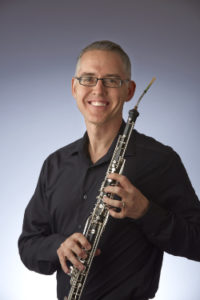Roger Roe, Indianapolis Symphony Orchestra

Photo credit: Indianapolis Symphony Orchestra
My dad was a minister, and almost all of my friends outside of the orchestra are teachers, preachers, therapists, or others in the healing and helping professions. That makes it intuitive and natural for me to look for ways to build friendships and personal connections in every part of life. When serving on various committees with the ISO, I try to remember the value of building bonds and the teachings of heroes of mine like Dietrich Bonhoeffer: “The person who loves those around them will create community.”
Orchestras can be strange workplaces. Loving those around us may not be the first thing that comes to mind. We come to work and sit quietly while also working in solitude at home for hours each week. There may be some time in the lounge at break or in the locker room together, but we have nothing like the daily work dynamics found in most other professions. That can create a few challenges when it comes to getting to know one another. However, with some work onstage and offstage, I have seen our connections deepen, leading to a beautiful sense of family and commitment. One of the results of this, not too surprisingly, is a commitment to work with each other for the common good and a subsequently high willingness to serve on committees and work for solutions, even in the face of steep challenges. We have a history of highly-developed personal bonds that contributes greatly to the overall strength of our orchestral community.
Whether we even like each other or not, whether we agree on politics, religion, phrasing decisions or intonation, we will, one way or another, spend our lives creating art in close community with one another. That’s always easier and better when we have grace and humanity in our hearts and know each other as people more deeply. I know that I have found some of my best friends along the way, too. After all, we are the Union. We are the family. We play for each other’s weddings and sew that quilt for your new baby. We pick you up from the doctor’s office and drop your kids off at school when you can’t.
One of our most fun and successful efforts at community-building in Indianapolis has been as easy as having people over after a concert. We (in non-pandemic times) have a welcome party for each new member of the orchestra. Veteran members get together during the week of the party and invent a new cocktail or other drink to serve for the party, often based on the favorite beverage of the new member or members. We try to call it something clever, using their own name, hometown or instrument. Seoul Sister, The Blue Lou, String Theory, Jen Blossom, and The Panamaniac are a few colorful past examples. The orchestra musicians’ fund pays a small amount to cover basic costs of the party, and everyone brings a dish to share. The leaders and members of the new member’s section propose a toast to them, and everyone gets to know everyone else a bit better. At one such party, our bassoonists did a skit for their newest member, our first clarinet player came out of his shell and roasted his new section mate with some pretty funny jokes, and later in the evening, that old Russian cellist told some amazing stories about his time working with Rostropovich.
My husband and I make it a point to invite new members over to our house for a meal or drinks. We ask them to perform special music as guests at our church. People want to be known and to make new connections, even and especially across generations or identities. We’ve had lots of revealing interactions at those events, and all of them help us to get to know one another better. Some players will have questions about the dynamics of the orchestra—“Tell me about that lockout you guys had in 2012.” Some will tell you about a hobby you might share—“Did I see on Facebook that your first oboe player is a big runner? I love running.” Some may even tell you more personal things—“I am really introverted. It’s hard for me to be around this many people for long; thanks for having me over, but I’m going to call it a night.” The ISO musicians also hold an official new member orientation, and between the informal and formal events, we build our friendships more and more deeply.
Intentional community-building fosters both camaraderie and solidarity. Our bonds have been and will be tested. We may disagree, but we can still love the folks in the orchestra who advocate for the other side of an argument. We know we will go out for a meal soon, even if we need to take a break from each other for a while. By taking our new members out to eat and helping them feel settled in town, not only do we find that next book club member or that great French cook, but we may also identify that musician who is genuinely curious about being in Union leadership down the road.
We cannot help but grow stronger if we consciously engage in love for one another and for the collective body of artists that we are.
The Panamaniac
Created in 2106 to welcome of
Pedro Fernández, section percussionist2 parts rum
2 parts club soda
1 part lime juice, muddled with mint
1 part mango nectar
1 part sparkling wine
Agave syrup
1 dash orange bittersStir to combine and
garnish with an orange peel





